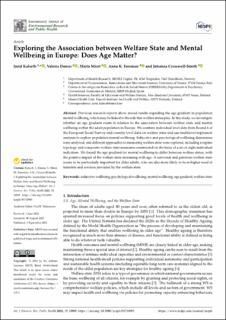Exploring the Association between Welfare State and Mental Wellbeing in Europe: Does Age Matter?
Peer reviewed, Journal article
Published version
Permanent lenke
https://hdl.handle.net/11250/3055121Utgivelsesdato
2022Metadata
Vis full innførselSamlinger
- Publikasjoner fra CRIStin - SINTEF AS [5801]
- SINTEF Digital [2501]
Originalversjon
International Journal of Environmental Research and Public Health (IJERPH). 2022, 19 (17), 10985. 10.3390/ijerph191710985Sammendrag
Previous research reports show mixed results regarding the age gradient in population mental wellbeing, which may be linked to the role that welfare states play. In this study, we investigate whether an age gradient exists in relation to the association between welfare state and mental wellbeing within the adult population in Europe. We combine individual level data from Round 6 of the European Social Survey and country level data on welfare state and use multilevel regression analyses to explore population mental wellbeing. Subjective and psychological wellbeing dimensions were analyzed, and different approaches to measuring welfare state were explored, including a regime typology and composite welfare state measures constructed on the basis of a set of eight individual indicators. We found the age gradient for mental wellbeing to differ between welfare states, with the positive impact of the welfare state increasing with age. A universal and generous welfare state seems to be particularly important for older adults, who are also more likely to be in higher need of transfers and services provided by the welfare state.

